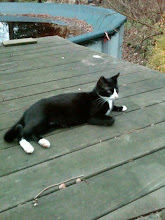Weblogs: Their use and application in science and technology libraries
This article provided an interesting history of blogs (in all honesty, I hate that word) and find it very neat that they sprung from sites that summarized new/interesting websites way back in 1996, when the Internet was much smaller obviously. I wonder if things like Digg are similar to this now or are there other sites that still do this? I really do not know but I would think it would be next to impossible because of the sheer size of the Internet.
I like the whole idea of 'co-evolution' instead of control when it comes to interaction between people on blogs. I can only assume that's a main draw of them and I am starting to see how they could really help for members of research projects, especially in medicine and other fields where timeliness of publication, etc. is very important.
I didn't really understand the whole 'having to go to the website' criticism of blogs. This is the only criticism metioned in the article and it is laughably minor. I wonder if other criticisms exist.
It is going to be more and more important for librarians of all types to know how to create and use blogs effectively. However, creating them is the easy part. Finding the time to keep them updated, etc. isn't so easy.
Using a wiki to manage a library instruction program...
This article provides a good definition and various uses of wikis in a very specific setting. The main idea I got from the article is that knowledge should be shared, coordinated and built upon and that's what wikis do. In the long run, I wonder what effect wikis and blogs will have on advances in science and technology.
Creating the academic library folksonomy...
Trying to 'catalog the Internet' seems like an impossible task but through social tagging of items from a variety of web sources (licensed databases, etc), it is a good replacement for the idea of cataloging. The article is right in that there is a lot of 'gray literature' out there. Right now at work, we have a subscription to the New York Academy of Medicine Gray Literature Report which arrives bimonthly to my email address and provides links to hundreds of gray articles, reports, etc. Here's a link to the most current report
This report helps but how do we really know what else is out there that would benefit the research being done in my department? Hopefully because of things like Zotera and citeulike which are somewhat easy to use and very helpful, more and more people will get turned onto tagging.
Wikipedia video
It's interesting that this class has been the only one in my MLIS program that had readings from Wikipedia. Most other professors forbid the use of it quite adamantly. Because of this, it was just beat into my head that Wikipedia was useless for research purposes and information found on it cannot be trusted. My opinion has changed from watching the video. Wales said that 'everyone should have free access to the sum of human knowledge' and that is quite a great goal to have. I did not realize that changes, etc. were done by a close-knit community who take their jobs very seriously and he also points out that people who write an encyclopedia for FUN tend to be smart, - I don't think anyone could disagree with that!
The fact that they handle controversial articles well, are quick to take action when someone does something bad (i.e. the skinhead example) and claim to not have the built-in biases that other encyclopedias and textbooks have makes me trust it a lot more. Verifying a wikipedia entry's references will always be necessary (and just a good practice) but at least I feel like I can use it with more confidence now.
Subscribe to:
Post Comments (Atom)

2 comments:
I too had a better appreciation for the validity of Wikipedia after viewing the video (even if I found the founder a little skeevy), because like you I had also been told that Wikipedia was to be avoided at all costs. Their intent seems to be noble and they back it up with swift action.
I agree with your assessment about the use of Wikipedia. It gets a bad rap regarding its usability and validity. Just as Reuters can get caught publishing doctored photos, albeit with good intentions, sites like Wikipedia deserve a fair shake and the chance to correct any oversights, if any.
Post a Comment